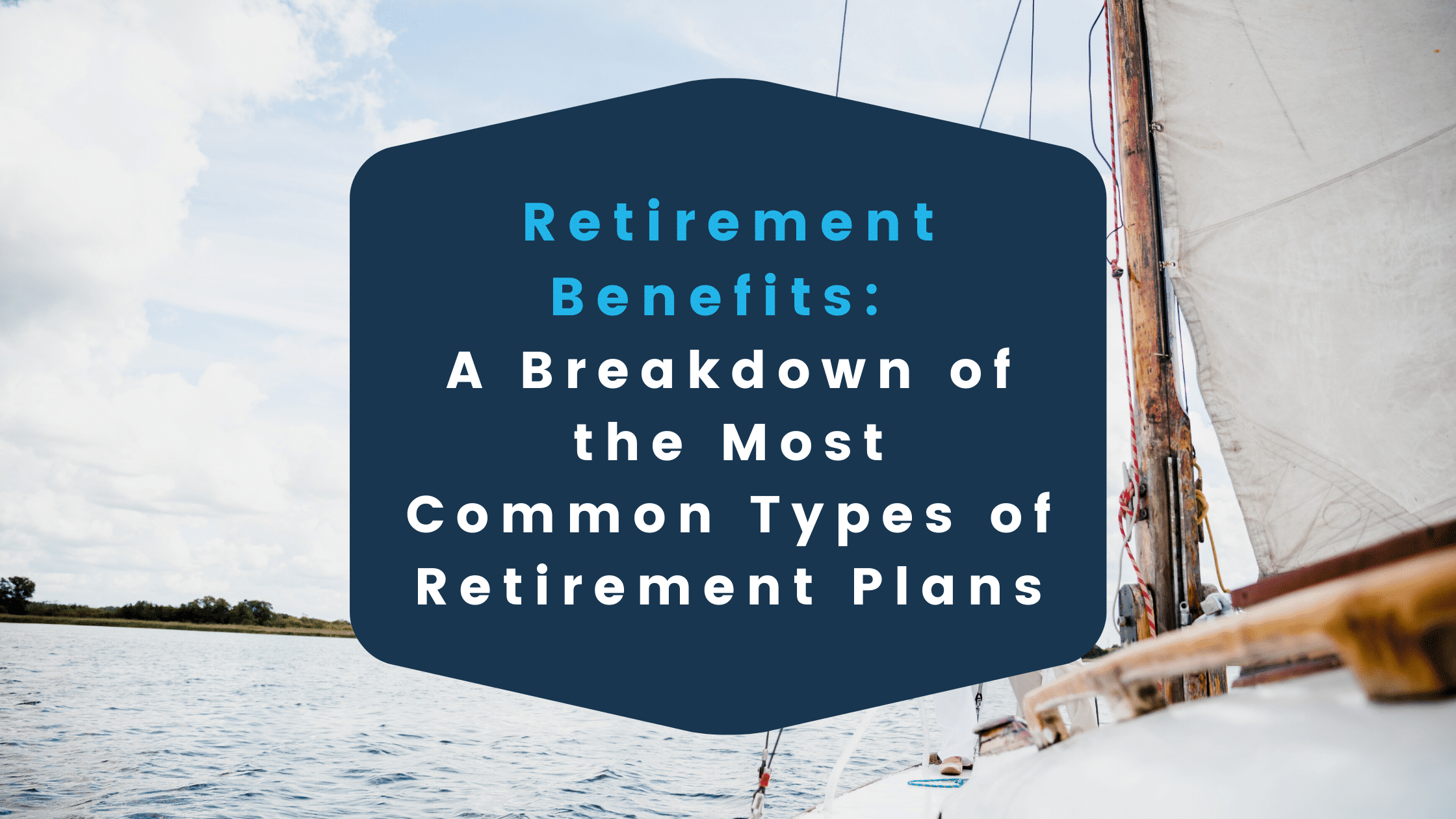Retirement Benefits: A Breakdown of the Most Common Types of Retirement Plans

Retirement plans can be a fickle thing when offering them to employees, as there is no one size fits all approach to them. There are many retirement options out there to offer your employees, and the one you end up choosing depends on a multitude of factors. Choosing the right retirement plan for your business can be a valuable tool for recruiting and retaining employees, but with the number of options out there that you can offer you have to make sure that what you are choosing is the best value for your business. The right retirement plan for your business is one that benefits both you and your employees; by saving your company money and ensuring that your employees are prepared for their retirement years. This week we wanted to break down some of the retirement benefits that you can offer your employees and which benefits might be right for your business.
Retirement Benefits
At its most basic level, employee retirement plans help employees make sure they have enough money saved for retirement. Essentially, all plans are savings vehicles that employers can choose to offer their employees that allow those employees to save their retirement on a tax-advantage basis. There are two main categories of retirement plans that you can offer your employees: a defined benefit plan and a defined contribution plan.
A defined benefit plan provides a guaranteed monthly benefit amount at a time of retirement for the employee. An example of this type of plan would be an employee pension. With this type of plan, the employer is responsible for making all the investment decisions and planning, thus assuming all the risk. A defined contribution plan does not offer the same guaranteed payout at the time of retirement that the defined benefit plan offers. Instead, both employees and employers contribute to the savings plan, usually at a set percentage of the employee’s annual salary. The employee takes on the risk in this type of plan, with the value of their account changing depending on the value of their investments. At the time of retirement, the employee will receive the account balance based upon their contributions and plus or minus the gains and losses from their investments.
Common Types of Retirement Plans There are many types of retirement benefit plans out there, but for the sake of this article, we’re just going to cover a few of the most common ones that employers offer your employees. Finding the right one for your business is largely dependent on your situation, and you should consult with your company’s accountant to figure out what plan would be best for you and your employees. The most common retirement plans are: 1) Pension Plans: This type of retirement plan is called a “defined benefit” because employees and employers know the formula for calculating retirement benefits ahead of time, and they use it to define and set the benefits paid out. Pension plans differ from other retirement funds, like retirement savings accounts, where the payout amounts depend on investment returns. Instead, employers take on all of the risk for these plans, and if there are poor investment returns or faulty assumptions and calculations resulting in a funding shortfall, then the employer is legally obligated to make up the difference with a cash contribution. 2) 401(k) Plan: This is the most common type of employer-sponsored plan that you can offer. With the 401(k), the employee is responsible for funding the plan, but you can also offer to match a certain percentage of the employee’s contributions. Employees also can choose which investments their money goes towards and retain complete control of the account at their retirement. Employee contributions to this plan are eligible for annual tax deductions of up to $18,000. If the employee is 50 years or older, they are granted a catch-up provision that allows them to contribute an additional $6,000 a year. 3) Roth 401(k) Plan: This type of plan offers the same benefits as a traditional Roth IRA with the same employee contribution limits as the traditional 401(k) plan. What differs though is that a Roth 401(k) does not offer tax deductions for contributions, but instead allows an employee to not pay taxes on the withdrawn amount during retirement as long as the employee is over 591/2 years old and have maintained the money for a minimum of 5 years. Employers can offer to match contributions to a Roth 401(k), but these contributions need to be put into a standard 401(k) plan. Employee contribution limits remain the same for both Roth 401(k) and 401(k) plans. 4) 403(b) Plan: This type of plan is similar to the 401(k) plan. The 403(b) plan is designated for nonprofit organizations such as hospitals, public school systems, churches, etc. Employees fund these plans just like a 401(k), but also include faster vesting of funds and the ability to make additional catch-up contributions. 5) SIMPLE Plan: A Savings Incentive Match Plan for Employees (SIMPLE) is a type of tax-deferred retirement account that you can establish for your employees. It is similar in some ways to 401(k) and 403(b) plans but are simpler and have lower start-up and administrative costs than those plans. The IRS only allows employers with fewer than 100 employees, and which do not offer other retirement plans, to establish SIMPLE IRAs. The SIMPLE Plan has all the same rules on investments, distributions, and rollovers as traditional IRAs.
Which Retirement Plan is Right for your Business? Choosing which plan is right for your business largely depends on a number of factors. How many employees do you have? Can your business afford to offer a retirement matching program for your employees? What options do your employees seem receptive to? Those are just some questions that can help guide your decision to choosing the right retirement plan for your business. Knowing more about the different plans that are out there can help you make a more informed decision when picking the right one for your business. It’s best to consult with your business’s accountant to see what kind of benefits your business can afford.
Need help deciding what benefits are best for your business? SolveHR takes the guesswork out of choosing benefits with our experts who are trained to find a solution tailored to your business’s needs. Contact us to find out how our transactional HR services can simplify the administration work that goes into managing benefits so you can focus on what matters—growing your business!?
Subscribe to receive all our blogs
Written by: Matthew MurielMeet Matthew! Matthew is our content writer and has been working with us for a year. He enjoys working for SolveHR because it allows him to practice his copywriting and allows him to build experience in his fledgling career. Matthew studied at the University of Texas at San Antonio and earned his degree in English with a concentration in Professional Writing. He values learning new processes in the HR industry and then conveying those ideas to the company’s clients. When he isn’t working, he enjoys reading nonfiction, with his favorite book that he recently read being The Gene by Siddhartha Mukherjee. If he could go anywhere in the world he would travel across the United States and visit all of the national parks.
Experience Hassle-Free Payroll Today
Request a demo to see our services in action!

